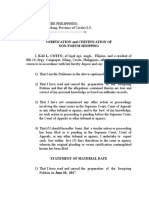Credibility of Witness Jurisprudence
Credibility of Witness Jurisprudence
Uploaded by
Jett LabillesCopyright:
Available Formats
Credibility of Witness Jurisprudence
Credibility of Witness Jurisprudence
Uploaded by
Jett LabillesOriginal Description:
Copyright
Available Formats
Share this document
Did you find this document useful?
Is this content inappropriate?
Copyright:
Available Formats
Credibility of Witness Jurisprudence
Credibility of Witness Jurisprudence
Uploaded by
Jett LabillesCopyright:
Available Formats
1.
Jurisprudence is consistent that for testimonial evidence to be
believed, it must not only come from a credible witness but must be
credible in itself tested by human experience, observation, common
knowledge and accepted conduct that has evolved through the
years1.
Daggers v. Van Dyck2, illuminates:
Evidence to be believed, must not only proceed from the mouth of
a credible witness, but it must be credible in itself such as the
common experience and observation of mankind can approve as
probable under the circumstances. We have no test of the truth of
human testimony, except its conformity to our knowledge,
observation, and experience. Whatever is repugnant to these
belongs to the miraculous and is outside of judicial cognizance
2. In People v. Quino3 evidence to be believed must, not only proceed
from the mouth of a credible witness (which alone is already
doubtful in the case at bench), but must be credible in itself, such
that the common experience and observation of man can approve as
probable under the circumstances. |||
3. In the case of Abaya vs. Ang4, the Supreme Court ruled that “A
preliminary investigation is in effect a realistic judicial appraisal of
the merits of the case; sufficient proof of the guilt of the criminal
respondent must be adduced so that when the case is tried, the trial
court may not be bound, as a matter of law, to order an acquittal.
Although a preliminary investigation is not a trial and is not intended
to usurp the function of the trial court, it is not a casual affair; the
officer conducting the same investigates or inquires into the facts
concerning the commission of the crime with the end in view of
determining whether or not an information may be prepared against
the accused. After all, the purpose of preliminary investigation is not
only to determine whether there is sufficient ground to engender a
well-founded belief that a crime has been committed and the
respondent therein is probably guilty thereof and should be held for
1 People v. Mirandilla, G.R. No. 186417, July 27, 2011
2 concurring opinion of Associate Justice Conchita Carpio Morales in Lejano v. People, G.R. No.
176389, 14 December 2010 citing 37 N.J. Eq. 130, 132 as cited in People v. Mirandilla, G.R. No.
186417, July 27, 2011
3 G.R. No. 105580, [May 17, 1994], 302 PHIL 422-428
4 G.R. No. 178511. December 4, 2008
trial; it is just as well for the purpose of securing the
innocent against hasty, malicious and oppressive
prosecution, and to protect him from an open and public
accusation of a crime, from the trouble, expense and
anxiety of a public trial.” (Emphasis supplied)
4. Probable cause, for the purpose of filing a criminal information, has
been defined as such facts as are sufficient to engender a
well-founded belief that a crime has been committed and
that respondent is probably guilty thereof. The term does not
mean 'actual or positive cause' nor does it import absolute certainty.
It is merely based on opinion and reasonable
belief. Probable cause does not require an inquiry . . .
whether there is sufficient evidence to procure a conviction.
It is enough that it is believed that the act or omission
complained of constitutes the offense charged5
5Reyes v. Ombudsman, G.R. Nos. 212593-94, 213163-78, 213540-41, 213542-43, 215880-94 &
213475-76, [March 15, 2016] citing Reyes v. Pearlbank Securities, Inc., 582 Phil. 505, 518-519 (2008);
emphases and underscoring supplied.
You might also like
- Kama SutraDocument96 pagesKama SutraAnderson London100% (1)
- Motion To Plea Bargain 3Document4 pagesMotion To Plea Bargain 3Mata Law-AdminNo ratings yet
- Legal-Wrting DRAFT Complaint Grave-CoercionDocument4 pagesLegal-Wrting DRAFT Complaint Grave-CoercionVel JuneNo ratings yet
- Office of The Prosecutor Region 7Document2 pagesOffice of The Prosecutor Region 7Yasie T. Dungog100% (1)
- 08 - Combined Verification, Certification Against Forum Shopping and Statement of Material DatesDocument2 pages08 - Combined Verification, Certification Against Forum Shopping and Statement of Material Datesroy rebosuraNo ratings yet
- Information Acts of LasciviousnessDocument2 pagesInformation Acts of LasciviousnessJett Labilles50% (2)
- Application of RPC Penalties in Special LawDocument3 pagesApplication of RPC Penalties in Special LawRyan AcostaNo ratings yet
- Comelec Resolution No. 8882Document3 pagesComelec Resolution No. 8882janieoctiaNo ratings yet
- Doj OmbDocument2 pagesDoj OmbGlenda DuyaoNo ratings yet
- Answer To Cross ClaimDocument5 pagesAnswer To Cross ClaimJeff SantosNo ratings yet
- Lack of Authority From Corporation in Filing Criminal ComplaintsDocument3 pagesLack of Authority From Corporation in Filing Criminal ComplaintsBobby Olavides Sebastian100% (2)
- Libel - Case LawDocument9 pagesLibel - Case LawBey VillanuevaNo ratings yet
- Crim14799 Motion 2 Release Cash BondDocument1 pageCrim14799 Motion 2 Release Cash Bondatty_gie3743No ratings yet
- 1.B Sample Order Granting Petition To Post Bail With Prayer To Reduce Amount of BailDocument1 page1.B Sample Order Granting Petition To Post Bail With Prayer To Reduce Amount of BailBetty Camp100% (1)
- Affidavit of LossDocument1 pageAffidavit of LossJett LabillesNo ratings yet
- DocumentationDocument408 pagesDocumentationaliaj2No ratings yet
- The Cambridge History of Jewish Philosophy Vol 1 PDFDocument899 pagesThe Cambridge History of Jewish Philosophy Vol 1 PDFG Maria Grigore100% (13)
- Hobsbawm, E. J. (1972) - The Social Function of The Past: Some Questions, Past and Present N. 55Document15 pagesHobsbawm, E. J. (1972) - The Social Function of The Past: Some Questions, Past and Present N. 55Naroa AretxabalaNo ratings yet
- Bp22-Complainant DiesDocument1 pageBp22-Complainant DiesNyl AnerNo ratings yet
- Memorandum of Agreement (Pineridge)Document2 pagesMemorandum of Agreement (Pineridge)caicaiiNo ratings yet
- Pre Trial Brief ProsecutionDocument3 pagesPre Trial Brief ProsecutionLawrence Ȼaballo BiolNo ratings yet
- Letter To Supreme Court - SALN GuidelinesDocument3 pagesLetter To Supreme Court - SALN GuidelinesBlogWatchNo ratings yet
- Counter Affidavit PaggaoDocument9 pagesCounter Affidavit Paggaotristan_adviento32No ratings yet
- Grave CoercionDocument2 pagesGrave CoercionImelda Arreglo-AgripaNo ratings yet
- Summons: BFAR 7, Represented by JOSEFINA D. Flores, Administrative Case NoDocument6 pagesSummons: BFAR 7, Represented by JOSEFINA D. Flores, Administrative Case NoFulgencio Dos PalosNo ratings yet
- Offer To Plead Guilty To A Lesse CrimeDocument4 pagesOffer To Plead Guilty To A Lesse CrimeNestoni M. SenarillosNo ratings yet
- Legitime in Testate Succession: Mortis (Time of Death)Document6 pagesLegitime in Testate Succession: Mortis (Time of Death)No MercyNo ratings yet
- Perjury - VenueDocument2 pagesPerjury - VenueBey VillanuevaNo ratings yet
- PD 705 Acquitted CaseDocument12 pagesPD 705 Acquitted CaseBizmates Noemi A NoemiNo ratings yet
- OCA Circular No. 19-2024Document12 pagesOCA Circular No. 19-2024tpr1nc3ss6No ratings yet
- Slight Physical Injury ResearchDocument5 pagesSlight Physical Injury ResearchDee ComonNo ratings yet
- Comment Opposition On The Formal Offer of Evidence by Defendant Rosalinda MasangcayDocument3 pagesComment Opposition On The Formal Offer of Evidence by Defendant Rosalinda MasangcayJaime GonzalesNo ratings yet
- Republic Act No. 9344Document47 pagesRepublic Act No. 9344Nur SanaaniNo ratings yet
- Research - Check Presented After 90 DaysDocument3 pagesResearch - Check Presented After 90 DaysBon Hart100% (2)
- Affidavit of Loss (Rod) - Vicente H. HingpitDocument2 pagesAffidavit of Loss (Rod) - Vicente H. HingpitDave Gerard CortesNo ratings yet
- Decision PD 1619Document3 pagesDecision PD 1619Lzl BastesNo ratings yet
- Motion For Release of VehicleDocument10 pagesMotion For Release of VehicleAstralDropNo ratings yet
- Jurisprudence (PERJURY)Document4 pagesJurisprudence (PERJURY)Harold Mape100% (2)
- Regional Trial Court Branch 83: PlaintiffDocument1 pageRegional Trial Court Branch 83: Plaintiffheart leroNo ratings yet
- Plain English / Plain Language Version of "Ad Cautelam"Document3 pagesPlain English / Plain Language Version of "Ad Cautelam"Ricca ResulaNo ratings yet
- Subject: Guidelines On The Katarungang Pambarangay ConciliationDocument14 pagesSubject: Guidelines On The Katarungang Pambarangay ConciliationJillandroNo ratings yet
- Certificate of DetentionDocument1 pageCertificate of DetentionConcepcion Mps100% (1)
- Attestation ClauseDocument1 pageAttestation ClauseATTORNEYNo ratings yet
- No Intent To KillDocument4 pagesNo Intent To KillRyan AcostaNo ratings yet
- Writ of Demolition Injunction Doctrine v2Document31 pagesWrit of Demolition Injunction Doctrine v2Gerald MesinaNo ratings yet
- Affidavit of Loss - docxATMDocument16 pagesAffidavit of Loss - docxATMDiana Joy SimonNo ratings yet
- Rules and Jurisprudence On The Use of AliasDocument17 pagesRules and Jurisprudence On The Use of AliasThessaloe B. FernandezNo ratings yet
- Jurisprudence (Indar Annulment Cases)Document4 pagesJurisprudence (Indar Annulment Cases)Christine Tria PedrajasNo ratings yet
- Easement NotesDocument4 pagesEasement NotesKvyn HonoridezNo ratings yet
- Revised PAO Operations ManualDocument49 pagesRevised PAO Operations ManualFrancis GuinooNo ratings yet
- SpecPro - Venue and Jurisdiction - Settlement of Estate - MdabarcomaDocument9 pagesSpecPro - Venue and Jurisdiction - Settlement of Estate - MdabarcomaMa. Danice Angela Balde-BarcomaNo ratings yet
- Qualified TheftDocument9 pagesQualified TheftAly ComiaNo ratings yet
- Contract of Deposit Security Deposit AgreementDocument2 pagesContract of Deposit Security Deposit AgreementGuineaMaeEugarolfNo ratings yet
- Sample of Template For A Complaint Filed Before The MCTCDocument2 pagesSample of Template For A Complaint Filed Before The MCTCdrainer ggNo ratings yet
- AdulteryDocument2 pagesAdulteryonlineonrandomdaysNo ratings yet
- Salient Features of The Rules On Electronic Evidence and Rules On Dna EvidenceDocument2 pagesSalient Features of The Rules On Electronic Evidence and Rules On Dna Evidencejuvpilapil100% (4)
- Defense For Recantations and Affidavit of Desistance JurisprudenceDocument17 pagesDefense For Recantations and Affidavit of Desistance JurisprudenceJohn Andrew ClanorNo ratings yet
- OCA Circular No. 121 2007 PDFDocument1 pageOCA Circular No. 121 2007 PDFNestoni M. SenarillosNo ratings yet
- Affidavit of MeritDocument2 pagesAffidavit of MeritFS YNo ratings yet
- HSAC Case Form No. 2 HOA COMPLAINTDocument6 pagesHSAC Case Form No. 2 HOA COMPLAINTcatherine de guzmanNo ratings yet
- Elements of The Crime of PerjuryDocument3 pagesElements of The Crime of PerjuryYanyan De Leon100% (1)
- Contract of LoanDocument2 pagesContract of LoanJanny Carlo SerranoNo ratings yet
- Guidelines On Archiving of Criminal and Civil CasesDocument2 pagesGuidelines On Archiving of Criminal and Civil Casesidemsonam100% (1)
- RA 3019 - Anti-Graft and Corrupt Practices ActDocument7 pagesRA 3019 - Anti-Graft and Corrupt Practices ActAnonymous KgPX1oCfr100% (1)
- NOTES - Criminal CasesDocument3 pagesNOTES - Criminal CasesZaira Gem GonzalesNo ratings yet
- Reckless Imprudence JurisprudenceDocument3 pagesReckless Imprudence JurisprudenceRoger nocomNo ratings yet
- Writ of KalikasanDocument9 pagesWrit of KalikasanJett LabillesNo ratings yet
- Regulation of Public MarketDocument3 pagesRegulation of Public MarketJett LabillesNo ratings yet
- Bill of Rights ComparisonDocument8 pagesBill of Rights ComparisonJett LabillesNo ratings yet
- Dive Ed SheeranDocument1 pageDive Ed SheeranJett LabillesNo ratings yet
- SAmple Motion For Extension of TIme To Submit COunterDocument1 pageSAmple Motion For Extension of TIme To Submit COunterJett Labilles100% (1)
- Affidavit of Loss BlankDocument1 pageAffidavit of Loss BlankJett LabillesNo ratings yet
- NPC Advisory - Designation of Data Protection OfficerDocument8 pagesNPC Advisory - Designation of Data Protection OfficerJett LabillesNo ratings yet
- Civil Law 2 Cases General ProvisionsDocument48 pagesCivil Law 2 Cases General ProvisionsJett LabillesNo ratings yet
- Law On LeaseDocument7 pagesLaw On LeaseJett LabillesNo ratings yet
- Power of Local Chief ExecutiveDocument4 pagesPower of Local Chief ExecutiveJett LabillesNo ratings yet
- Moy Ya Lim Yao vs. Commissioner of ImmigrationDocument1 pageMoy Ya Lim Yao vs. Commissioner of ImmigrationJett LabillesNo ratings yet
- Manotok DigestDocument7 pagesManotok DigestJett LabillesNo ratings yet
- Quiz ObliconDocument2 pagesQuiz ObliconJett LabillesNo ratings yet
- Libertine Naag 2Document1 pageLibertine Naag 2Jett LabillesNo ratings yet
- Barry ManilowDocument1 pageBarry ManilowJett LabillesNo ratings yet
- Paris AgreementDocument23 pagesParis AgreementJett Labilles100% (1)
- First AidDocument53 pagesFirst AidJett LabillesNo ratings yet
- Gyeongbok Palace Namsan TowerDocument2 pagesGyeongbok Palace Namsan TowerJett LabillesNo ratings yet
- HDMFDocument5 pagesHDMFJett LabillesNo ratings yet
- Politics of GreeceDocument62 pagesPolitics of GreeceJett LabillesNo ratings yet
- Sample InformationDocument2 pagesSample InformationJett LabillesNo ratings yet
- Crimrev Set 1 CasesDocument140 pagesCrimrev Set 1 CasesJett LabillesNo ratings yet
- Lenski Library Book 1 - Rope Magic - Mission Magic - June 19Document12 pagesLenski Library Book 1 - Rope Magic - Mission Magic - June 19Gary GothamNo ratings yet
- Icici BankDocument66 pagesIcici BankMudita BhatnagarNo ratings yet
- Reading Comprehension - Donald Trump, The Anti-ImperialistDocument2 pagesReading Comprehension - Donald Trump, The Anti-Imperialistquesnot.englishteacherNo ratings yet
- Student Result: Session: 2020-21 (REGULAR) Semesters: 1 Result: Marks: 783/1200Document2 pagesStudent Result: Session: 2020-21 (REGULAR) Semesters: 1 Result: Marks: 783/1200Vikas YadavNo ratings yet
- Etech - GRP.3 QuizDocument4 pagesEtech - GRP.3 Quizglazioruzumaki303No ratings yet
- AESA Catalogue LV 05-05Document105 pagesAESA Catalogue LV 05-05joshyvattakkerry100% (2)
- Why Are Teenagers Very Fond of Social Networking Sites?"Document43 pagesWhy Are Teenagers Very Fond of Social Networking Sites?"Nicole Marin-Ching0% (1)
- Present Simple PDFDocument4 pagesPresent Simple PDFtrajano23210% (2)
- Drugstudy Assgn MauDocument9 pagesDrugstudy Assgn MauTricia EstremeraNo ratings yet
- Quality-Access To SuccessDocument131 pagesQuality-Access To SuccessAdelaNo ratings yet
- Department of Education: I. Encircle The Letter of The Correct AnswerDocument2 pagesDepartment of Education: I. Encircle The Letter of The Correct AnswerJhonabie Suligan Cadeliña100% (2)
- 7 - Ideation and PrototypingDocument44 pages7 - Ideation and PrototypingHasnain AhmadNo ratings yet
- (Francophone Postcolonial Studies) Martin Munro, Celia Britton-American Creoles - The Francophone Caribbean and The American South-Liverpool University Press (2012)Document265 pages(Francophone Postcolonial Studies) Martin Munro, Celia Britton-American Creoles - The Francophone Caribbean and The American South-Liverpool University Press (2012)matfilhoNo ratings yet
- Ch. 5 Determinants: Ring Determinant Functions Existence, Uniqueness and PropertiesDocument22 pagesCh. 5 Determinants: Ring Determinant Functions Existence, Uniqueness and PropertiesMas GundNo ratings yet
- EPAM-5000 Instruction Manual 1006 PDFDocument90 pagesEPAM-5000 Instruction Manual 1006 PDFNova Chisilia ZaharaNo ratings yet
- Clavister Virtual Core Series Vmware Getting Started Guide 12.00.05 enDocument85 pagesClavister Virtual Core Series Vmware Getting Started Guide 12.00.05 enNizar Hajji karwiNo ratings yet
- Birla Institute of Technology and Science, Pilani Pilani Campus AUGS/ AGSR DivisionDocument4 pagesBirla Institute of Technology and Science, Pilani Pilani Campus AUGS/ AGSR DivisionPriyam VermaNo ratings yet
- Original Mexican National Era PresentationDocument39 pagesOriginal Mexican National Era PresentationDebra AveilheNo ratings yet
- 8 - M (Physical) 8 - M: Period PeriodDocument1 page8 - M (Physical) 8 - M: Period Periodhafsa khalidNo ratings yet
- How To Write A Book Report. EnglishDocument2 pagesHow To Write A Book Report. EnglishKit Anton MacalosNo ratings yet
- Achive Stuck Situation and TroubleshootingDocument5 pagesAchive Stuck Situation and TroubleshootingNarendra ChoudaryNo ratings yet
- The Right To A Balanced and Healthful Ecology by Antonio G.M. La ViñaDocument30 pagesThe Right To A Balanced and Healthful Ecology by Antonio G.M. La Viñaellen joy chanNo ratings yet
- Prospectus 2011Document13 pagesProspectus 2011Gerard McNallyNo ratings yet
- Retrofit of Reciprocating Compressors - Hoerbiger ElectricDocument22 pagesRetrofit of Reciprocating Compressors - Hoerbiger ElectricRadu BabauNo ratings yet
- RA 110 Radiographic Techniques Packet Test 1Document20 pagesRA 110 Radiographic Techniques Packet Test 1sabba_420No ratings yet
- Lesson 10Document2 pagesLesson 10akokpanasNo ratings yet

















































































































